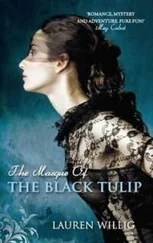"Now, then, Mynheer John, if I were in your place, I should not go out through the main street."
"And why so, as the dragoons of Tilly are still at their post?"
"Yes, but their order, as long as it is not revoked, enjoins them to stop before the prison."
"Undoubtedly."
"Have you got an order for them to accompany you out of the town?"
"We have not?"
"Well, then, in the very moment when you have passed the ranks of the dragoons you will fall into the hands of the people."
"But the burgher guard?"
"Alas! the burgher guard are the most enraged of all."
"What are we to do, then?"
"If I were in your place, Mynheer John," the young girl timidly continued, "I should leave by the postern, which leads into a deserted by-lane, whilst all the people are waiting in the High Street to see you come out by the principal entrance. From there I should try to reach the gate by which you intend to leave the town."
"But my brother is not able to walk," said John.
"I shall try," Cornelius said, with an expression of most sublime fortitude.
"But have you not got your carriage?" asked the girl.
"The carriage is down near the great entrance."
"Not so," she replied. "I considered your coachman to be a faithful man, and I told him to wait for you at the postern."
The two brothers looked first at each other, and then at Rosa, with a glance full of the most tender gratitude.
"The question is now," said the Grand Pensionary, "whether Gryphus will open this door for us."
"Indeed, he will do no such thing," said Rosa.
"Well, and how then?"
"I have foreseen his refusal, and just now whilst he was talking from the window of the porter's lodge with a dragoon, I took away the key from his bunch."
"And you have got it?"
"Here it is, Mynheer John."
"My child," said Cornelius, "I have nothing to give you in exchange for the service you are rendering us but the Bible which you will find in my room; it is the last gift of an honest man; I hope it will bring you good luck."
"I thank you, Master Cornelius, it shall never leave me," replied Rosa.
And then, with a sigh, she said to herself, "What a pity that I do not know how to read!"
"The shouts and cries are growing louder and louder," said John; "there is not a moment to be lost."
"Come along, gentlemen," said the girl, who now led the two brothers through an inner lobby to the back of the prison. Guided by her, they descended a staircase of about a dozen steps; traversed a small courtyard, which was surrounded by castellated walls; and, the arched door having been opened for them by Rosa, they emerged into a lonely street where their carriage was ready to receive them.
"Quick, quick, my masters! do you hear them?" cried the coachman, in a deadly fright.
Yet, after having made Cornelius get into the carriage first, the Grand Pensionary turned round towards the girl, to whom he said,—
"Good-bye, my child! words could never express our gratitude. God will reward you for having saved the lives of two men."
Rosa took the hand which John de Witt proffered to her, and kissed it with every show of respect.
"Go! for Heaven's sake, go!" she said; "it seems they are going to force the gate."
John de Witt hastily got in, sat himself down by the side of his brother, and, fastening the apron of the carriage, called out to the coachman,—
"To the Tol-Hek!"
The Tol-Hek was the iron gate leading to the harbor of Schevening, in which a small vessel was waiting for the two brothers.
The carriage drove off with the fugitives at the full speed of a pair of spirited Flemish horses. Rosa followed them with her eyes until they turned the corner of the street, upon which, closing the door after her, she went back and threw the key into a cell.
The noise which had made Rosa suppose that the people were forcing the prison door was indeed owing to the mob battering against it after the square had been left by the military.
Solid as the gate was, and although Gryphus, to do him justice, stoutly enough refused to open it, yet evidently it could not resist much longer, and the jailer, growing very pale, put to himself the question whether it would not be better to open the door than to allow it to be forced, when he felt some one gently pulling his coat.
He turned round and saw Rosa.
"Do you hear these madmen?" he said.
"I hear them so well, my father, that in your place——"
"You would open the door?"
"No, I should allow it to be forced."
"But they will kill me!"
"Yes, if they see you."
"How shall they not see me?"
"Hide yourself."
"Where?"
"In the secret dungeon."
"But you, my child?"
"I shall get into it with you. We shall lock the door and when they have left the prison, we shall again come forth from our hiding place."
"Zounds, you are right, there!" cried Gryphus; "it's surprising how much sense there is in such a little head!"
Then, as the gate began to give way amidst the triumphant shouts of the mob, she opened a little trap-door, and said,—
"Come along, come along, father."
"But our prisoners?"
"God will watch over them, and I shall watch over you."
Gryphus followed his daughter, and the trap-door closed over his head, just as the broken gate gave admittance to the populace.
The dungeon where Rosa had induced her father to hide himself, and where for the present we must leave the two, offered to them a perfectly safe retreat, being known only to those in power, who used to place there important prisoners of state, to guard against a rescue or a revolt.
The people rushed into the prison, with the cry—
"Death to the traitors! To the gallows with Cornelius de Witt! Death! death!"
Table of Contents
The young man with his hat slouched over his eyes, still leaning on the arm of the officer, and still wiping from time to time his brow with his handkerchief, was watching in a corner of the Buytenhof, in the shade of the overhanging weather-board of a closed shop, the doings of the infuriated mob, a spectacle which seemed to draw near its catastrophe.
"Indeed," said he to the officer, "indeed, I think you were right, Van Deken; the order which the deputies have signed is truly the death-warrant of Master Cornelius. Do you hear these people? They certainly bear a sad grudge to the two De Witts."
"In truth," replied the officer, "I never heard such shouts."
"They seem to have found out the cell of the man. Look, look! is not that the window of the cell where Cornelius was locked up?"
A man had seized with both hands and was shaking the iron bars of the window in the room which Cornelius had left only ten minutes before.
"Halloa, halloa!" the man called out, "he is gone."
"How is that? gone?" asked those of the mob who had not been able to get into the prison, crowded as it was with the mass of intruders.
"Gone, gone," repeated the man in a rage, "the bird has flown."
"What does this man say?" asked his Highness, growing quite pale.
"Oh, Monseigneur, he says a thing which would be very fortunate if it should turn out true!"
"Certainly it would be fortunate if it were true," said the young man; "unfortunately it cannot be true."
"However, look!" said the officer.
And indeed, some more faces, furious and contorted with rage, showed themselves at the windows, crying,—
"Escaped, gone, they have helped them off!"
And the people in the street repeated, with fearful imprecations,—
"Escaped gone! After them, and catch them!"
"Monseigneur, it seems that Mynheer Cornelius has really escaped," said the officer.
"Yes, from prison, perhaps, but not from the town; you will see, Van Deken, that the poor fellow will find the gate closed against him which he hoped to find open."
Читать дальше












